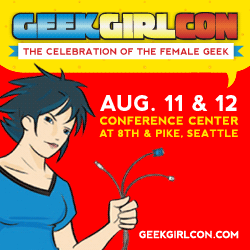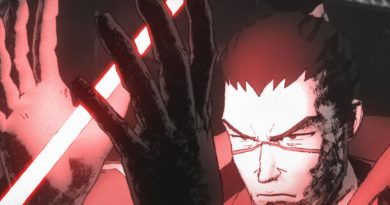GeekGirlCon 2013: Deconstructing the Mary Sue Myth Panel Recap
A few days ago I shared my recap of the Star Wars panel at GeekGirlCon. Over the next two days I want to talk about some of the other highlights of this year’s convention in Seattle. Today I’m focusing on one panel, because it is particularly relevant to my experience as a fan and a writer: Deconstructing the Mary Sue Myth.
Panelists included actress and novelist Amber Benson, clinical psychologist Dr. Andrea Letamendi, novelist and comic book writer Cecil Castellucci, and novelist Sarah Kuhn. The discussion was moderated by screenwriter and producer Javier Grillo-Marxuach, best known for his work on the television shows Lost and Medium.
 This panel went straight onto my must-see list for the con. Early in my days as a fanfiction writer, I heard the term Mary Sue being thrown around as an accusation against female characters in both the official Expanded Universe and in fanfic. For a time, I worried that I might be writing some of my favorite characters that way myself – until I researched what a Mary Sue character really is, the origin of the term, and how the term is often misused to dismiss female characters and marginalize female writers and readers. So I was very interested to hear what the distinguished panelists had to say on the topic. As expected, their remarks definitely rang true to me. These were some of my favorite moments from the discussion:
This panel went straight onto my must-see list for the con. Early in my days as a fanfiction writer, I heard the term Mary Sue being thrown around as an accusation against female characters in both the official Expanded Universe and in fanfic. For a time, I worried that I might be writing some of my favorite characters that way myself – until I researched what a Mary Sue character really is, the origin of the term, and how the term is often misused to dismiss female characters and marginalize female writers and readers. So I was very interested to hear what the distinguished panelists had to say on the topic. As expected, their remarks definitely rang true to me. These were some of my favorite moments from the discussion:
- Javier began the panel by explicitly noting that the term Mary Sue is used to criticize works by or for women, especially those with strong female characters. Although not all of the panelists had personally experienced the accusation, they agreed its impact is real.
- Javier posed the question of why the accusation of a Mary Sue is leveled at female characters, when some of the most famous male characters – such as James Bond, Indiana Jones, and Dr. Who – might fit the bill just as much. Amber commented that the notion that women can’t do everything men can is still pervasive in real life and toward female characters in fiction. Sarah noted that the accusation “not a good role model” is also aimed at female characters more than male ones. The effect is that women, and books geared for a female audience, are marginalized.
- A recurring theme of the discussion was the dynamic created when fear of being accused (even falsely) of writing a Mary Sue character impacts the creative process. At times, I’ve felt that fear, and had to remind myself that my characters were well-rounded and flawed, not perfect by any means. Sarah agreed that fear of bad Goodreads reviews can affect an author. Drea added that the fear is even higher in the age of the internet, now that the author can receive immediate feedback. She also explained that this can be maladaptive, hindering creativity in character design rather than encouraging it. Javier noted that in television, writers are told the characters must be “aspirational” – the protagonist has to be the smartest guy in the room, for example. Amber agreed that many protagonists in urban fantasy and young adult stories are expected to be aspirational, as well, but she also noted that many readers like characters who are real, such as the way Buffy Summers wants a normal life in addition to her Slayer destiny.
- Naturally the online Mary Sue Litmus Test came up. Drea explained that the test has become so lengthy and over-inclusive that it’s essentially useless, because almost any character would fail the test. (I definitely experienced this with the Star Wars Mary Sue Litmus Test back in the day, when essentially any female Jedi related to a movie character would automatically fail, regardless of how flawed or well-rounded she might be.) In addition, she emphasized that trying to avoid all the traits on the list would simply end up with a boring, one-dimensional character, instead of the depth well-written characters ought to have.
- The topic of sexism in the publishing industry and fandom also was raised. Javier wondered if it’s possible for women to get a fair read from among the circles of prominent critics and reviewers, when male authors are given so many free passes. Cecil agreed that women have to fight relentlessly just to get on the page of a source like the New York Times, and then they have to be better to garner equivalently positive reviews. Sarah agreed, and pointed out that when male authors write about feelings they’re lauded for their boldness and empathy, even thought women write about that all the time. She did note, though, that more people are starting to call out this double standard.
- Another double standard mentioned was the dismissiveness expressed in many circles toward the success of the Fifty Shades series, as well as to the negative fan reaction to the casting of Charlie Hunnam as Christian Gray. Amber opined that the numerous women purchasing the books were taking part in a collective reclaiming of sexuality and a rejection of the old notion that women shouldn’t enjoy sex. Sarah pointed out the irony that geek guys, who practically invented the concept of internet outrage, had no room to talk about women expressing their views about something that matters to them.
- Javier drew the panel to a close by asking each panelist to name their Anti-Sue character. Sarah chose Sandra Bullock’s character, Dr. Ryan Stone, in Gravity. Cecil picked Mako Mori in Pacific Rim. Amber selected Amy Dunne, the main female character in Gone Girl. Drea picked Boomer from Battlestar Galactica.
After the panel I talked to women who were part of the early Star Trek community, where the term Mary Sue was coined. They later moved on to Star Wars fandom. They felt that the panel hadn’t given enough context for the term, which in their mind is very much a slur meant to demean one group. With sites like TheMarySue.com using the name as a way to take back the power of the slur, it is true that many don’t understand the hurt and demoralization that accompanied that word for female fans and for fans of female characters.
Nothing highlights better how female characters can be regarded than the recent article at Tor.com. Writer Emily Asher-Perrin discusses a 1983 Rolling Stone interview with Carrie Fisher, where the actress is aware of the reasoning behind the metal bikini.
Leia had to be softened and sexualized for the final film because too many fans thought she was a “space bitch.”
It is hard today, with all the praise thrown Leia’s direction, to imagine that there were enough negative reactions to a powerful, effective female character that she needed to be made more likeable. In fact, it was this dynamic that may have discouraged female fans from outwardly expressing their love of the character and the franchise. Similarly, for all the praise of Mara Jade in fandom now, ten years ago the character and her fans were often subjected to scorn and ridicule, her character was often criticized as a Mary Sue, and eventually the derogatory nickname for the character, “Tang Stain,” was banned from use at the TheForce.Net forums. During the New Jedi Order era, Jaina Solo was similarly berated and her standalone book roundly beaten down by male fans. Yet at the last Star Wars convention fan cheers filled the room when a Jaina Solo standalone series of novels was announced. And while actresses alone can’t persuade a male audience to come around to a character, Jennifer Lawrence, Katee Sackhoff, and Ashley Eckstein reversed plenty of negative feedback from male fans aimed at Katniss Everdeen, Starbuck, and Ahsoka Tano.
My experience as a fanfiction writer came somewhat farther removed from those early years when the term Mary Sue was first used, and it had become a term meant to express dislike of a female character as opposed to challenging her characterization. Back when I first noticed the term it scared me, in much the same way the panelists described it might. Instead of chewing my nails I did considerable research and wrote about it, unfortunately most of it buried in the depths of the TFN Writing Resource Boards. Knowledge is power, and when I looked at some of the basic faults attributed to a Mary Sue, they are often found in mainstream male characters like James Bond, James T. Kirk, and even Luke Skywalker. If you’re nervous about a character, reach out to other writers and talk to them about it.
The Hathor Legacy has a great look at Mara Jade, detailing why she is not a Mary Sue. It is a great place to start educating yourself on the topic.
Tricia Barr took her understanding of brand management and marketing, mixed it with a love of genre storytelling, and added a dash of social media flare to create FANgirl Blog, where she discusses Star Wars, fandom, and strong female characters. She also writes about Star Wars for Random House’s science fiction and fantasy blog Suvudu.com and Star Wars Insider magazine and is a contributor for Her Universe’s Year of the Fangirl.
Tricia is putting the finishing touches on her first novel, Wynde – a military science fiction with a fantastical twist that features heroines Vespa and Gemini. For excerpts and tales of her adventures in creating a fictional universe, hop over to TriciaBarr.com.
For updates on all things FANgirl follow @FANgirlcantina on Twitter or like FANgirl Zone on Facebook. At times she tries the Tumblr.
- Hyperspace Theories: WICKED FOR GOOD Changes for the Better - November 28, 2025
- REVIEW: Star Wars Visions Volume 3 - October 29, 2025
- REVIEW: The Revenge of the Sith Novelization Deluxe Edition - October 15, 2025











Pingback:Star Wars at GeekGirlCon 2013 | Star Wars Blog